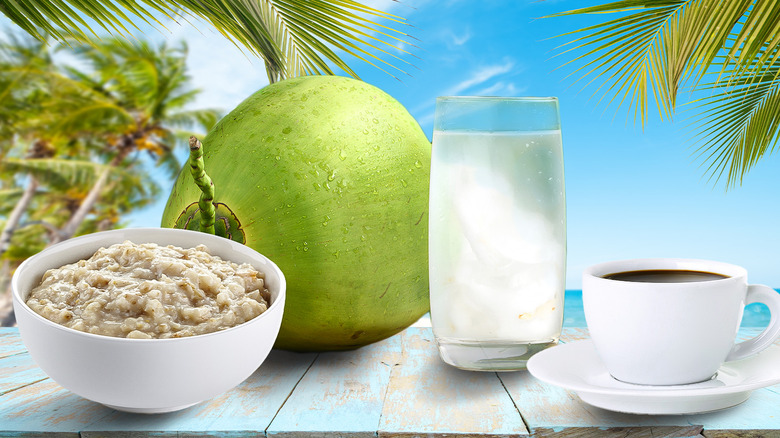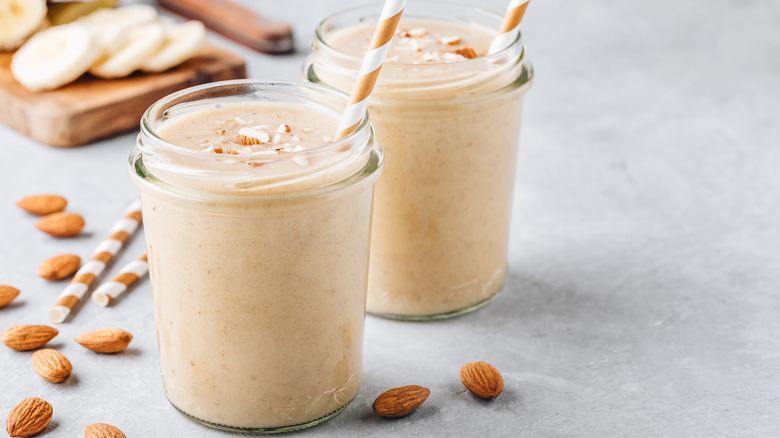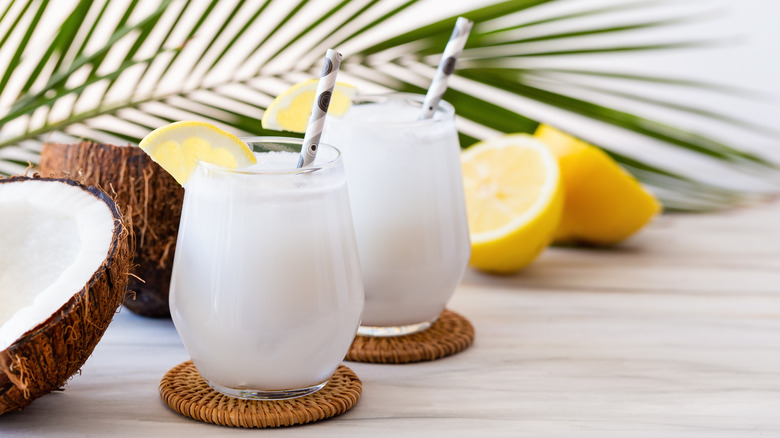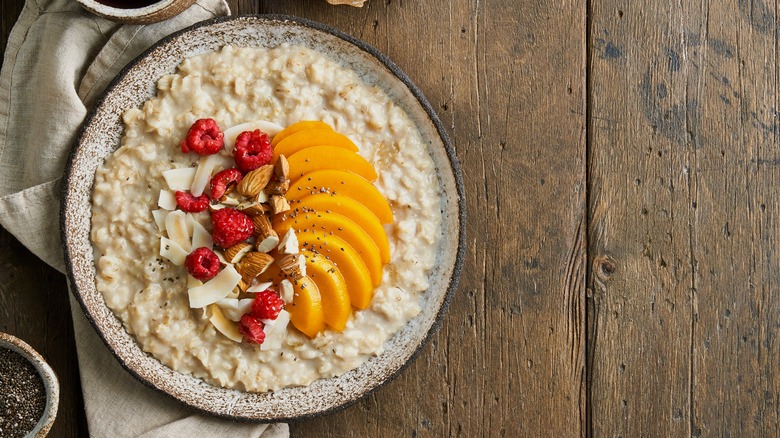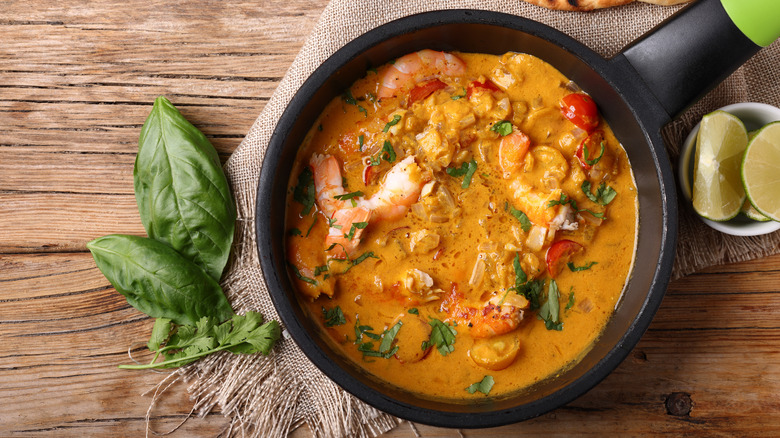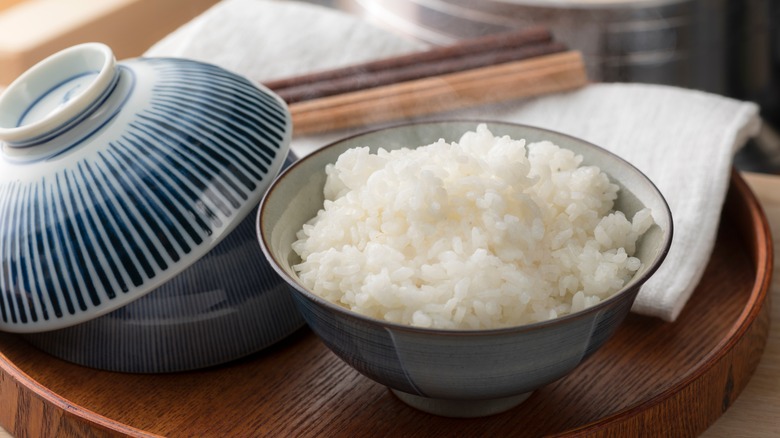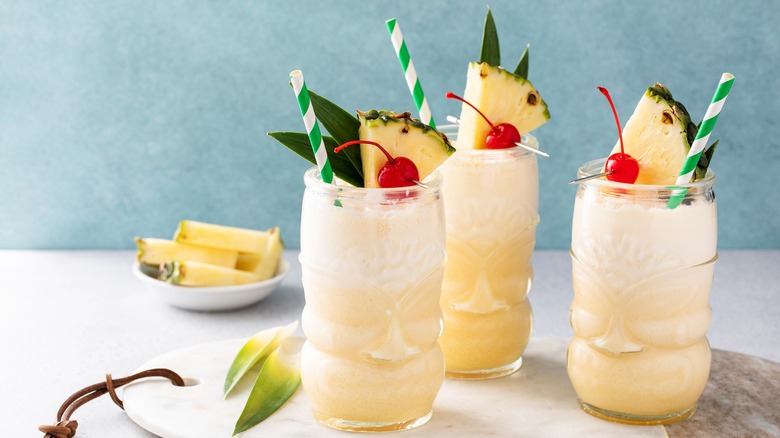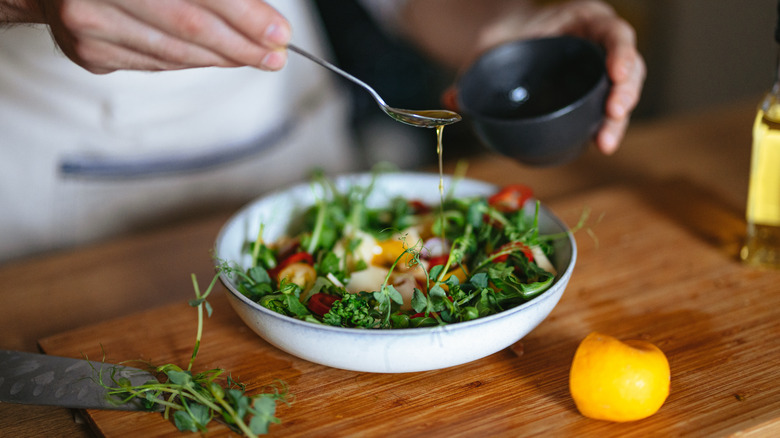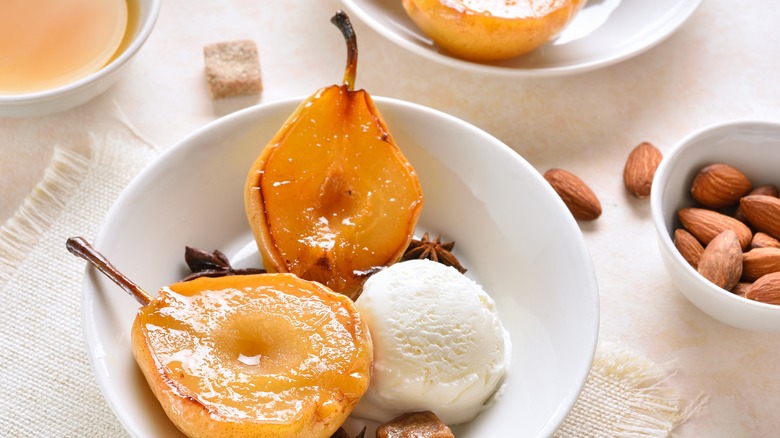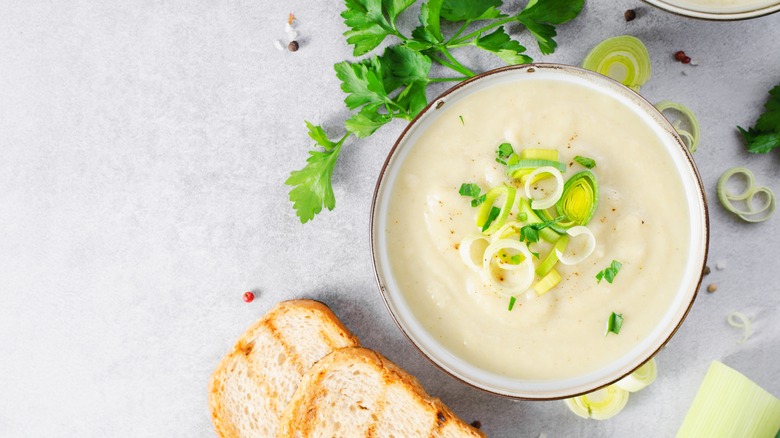12 Ways To Use Coconut Water
Packed with vitamins and minerals including potassium, calcium, and amino acids, coconut water is a healthy, hydrating, and incredibly tasty beverage that can be used for a wide range of purposes. Indeed, although coconut water is perfectly suited for drinking exactly as is direct from the carton or bottle — with its naturally sweet and nutty taste being mellow and refreshing — there are multiple ways to include this highly beneficial drink in your diet, whether you want to keep it center stage or fairly inconspicuous.
When used as an ingredient, coconut water can present itself as either bold and distinctive, or somewhat subtle, depending on what it is paired with and the quantities used. If you enjoy the earthy, slightly floral taste of coconut water, there are many means of bringing this delectable flavor to the forefront of your breakfasts, dinners, and even your coffee, perhaps in ways that you hadn't even thought about before.
And if you prefer a more tempered approach, there are still plenty of ways to include this nourishing and wholesome drink in your everyday routine without overpowering other ingredients. From cocktails to curries and smoothies to soups, coconut water finds its place almost seamlessly amongst a vast array of other foods and drinks, as well as demonstrating why it can hold its own as the star of the show.
Blend coconut water into smoothies
Coconut water serves as an excellent base for virtually any smoothie, providing hydration with a deliciously sweet and nutty taste, and bringing together all of your other ingredients without excess calories or sugar and no fat. Though you can use coconut water with a vast range of other fruits and vegetables in your smoothie, its flavor works particularly well with cocoa, bananas, and nuts such as almonds. This creates an earthy and mellow but temptingly sweet drink that can even be served as a dessert, which is both good for you and your taste buds.
In smoothie recipes that call for coconut cream, you can certainly substitute in coconut water, which will reduce the amount of added fat and calories to whip up a slightly lighter option. However, if making this substitution, you will likely need to add an extra source of creaminess, particularly if you are aiming for a thick smoothie, as this swap will no doubt change the texture of your drink.
To thicken your smoothie up, just add a few spoonfuls of yogurt, some avocado, or a banana, and you should reach the consistency you are after. Alternatively, simply reduce the amount of liquid in your smoothie before blending it all up.
Bring a nutty sweetness to coffee
Undoubtedly, the sweet and woody flavor profile of coconut goes hand in hand with rich and robust coffee, so it's no surprise that coconut iced coffee is a popular choice for many on their caffeine run. While coconut cream adds a luxurious richness to milky coffees such as lattes and frappes, coconut water adds a delicious boost of hydration to iced coffee, imparting the same nutritious flavor. This can prove particularly useful given that coffee is a diuretic, and can thus be dehydrating when consumed in excess.
The amount of coconut water you should add to your coffee is entirely based on personal preference, so it's best to experiment with different measurements of both regular water and coconut water in your coffee until you find a combination that you like. If you are particularly fond of the bold and punchy taste of strong coffee, you may discover that just a splash of coconut water is enough to imbue your cup with a little tropical and refreshing twist. However, if you have a full-bodied cup of coffee bordering on bitter, then a higher volume of coconut water will provide you with the sweetness and nuance to take the edge off, without adding unnecessary sugar.
Mix coconut water with lemonade for a tropical twist
The ideal summer thirst quencher, lemonade is a sweet, refreshing, and delicious drink that is only heightened by the addition of tropical and woody coconut. Indeed, with its mildly sweet taste, coconut water complements the tartness and sharpness of lemons to produce an invigorating and fresh drink that is not overpowering. Moreover, making lemonade with coconut water provides a healthier option than more conventional preparation methods, requiring far less sugar to achieve a similar level of sweetness — along with the additional benefits of the vitamins and minerals that are found in coconut water.
It couldn't be easier to make coconut water lemonade, either, requiring just two to three ingredients and very little prep time. Simply combine fresh lemon juice with coconut water (roughly 1 cup of lemon juice, or what you get from about 3 lemons, will be required per 4 cups of coconut water) and then mix in a little sugar or sweetener of your choice if required. The latter step will depend on whether you are using unsweetened or sweetened coconut water, so be sure to add any additional sweeteners gradually, sampling the lemonade often until it reaches your desired taste.
Perk up your oatmeal
Oatmeal, also known as porridge, is a great breakfast choice for a multitude of reasons, from its simple means of preparation to its array of nutritional benefits, including the crucial slow-release energy that it provides. However, sometimes the dish can begin to feel a little mundane, and, though there are many tips to make a perfect bowl of oatmeal — including through adding various toppings — one of the simplest but tastiest ways to bring a new lease on life to your oats is to swap your regular milk or water for coconut water.
Cooking your oats in coconut water provides them with real depth, and fills them with an earthy sweetness that lends itself perfectly to an array of mix-ins and toppings such as chocolate, nuts, and berries. Similarly, coconut water also works well when used as a substitute for other liquids in overnight oats, as the cereal becomes fully saturated with the delicious flavor of the coconut as it sits and absorb the nutty goodness as you sleep. The result is an incredibly easy but beautifully bold breakfast with an exotic undertone, ready to be scattered with additional coconut flakes and a generous helping of fresh fruit.
Add it to curries for extra flavor
It's no secret that coconut is a fairly common ingredient in a number of traditional curries. Classic Thai massaman, popular Indian korma, and indulgent Indonesian beef rendang are just a few among many well-loved curries that employ the use of coconut for a deep, rich flavor and a creamy consistency. Typically, either coconut cream or coconut milk is used in such recipes to provide a silky, buttery texture that is designed to be scooped up with rice or bread, but coconut water also serves a crucial purpose in creating — or elevating — tasty curries.
After being cooked and subsequently reduced for extended periods of time, curries can sometimes become overly thick and at risk of drying out. Adding in a little water, or vegetable or chicken stock, can help to bring some moisture back, but using coconut water is an optimal choice, doing more than just adding additional liquid to a thick curry, but also providing dimension and extra flavor alongside existing notes of coconut. Just a splash of coconut water not only reinvigorates curries that may be beginning to go dry, but also lends an enticing freshness and delicious earthiness that complements spices beautifully for complex and nuanced flavors.
Cook your rice in coconut water for a tasty side dish
Coconut rice is a popular side dish or base ingredient, particularly in many Asian dishes, with a characteristic sticky sweetness that pairs extremely well with savory ingredients and fresh toppings. Though some recipes will call for coconut milk or shredded coconut, you can create perfect coconut rice with a slightly more nuanced taste by simply swapping regular water for coconut water when you prepare it, whether in a rice cooker on in a pot on the stove.
Indeed, it couldn't be easier to imbue your rice with flavor, since the grain's only purpose when it is being cooked is to absorb the moisture — and subsequently the taste — of the liquid it is boiled in, with broth being another popular means of imparting flavor. Coconut water provides a light and fragrant twist to rice that is perfectly served alongside spicy curries or fragrant seafood dishes, and it can also be piled high with an array of fresh toppings in a coconut rice bowl.
Level up your ice cubes
Ice cubes need not be just a means of cooling down your drink — they can also act as a vessel for even more flavor and hydration, as well as providing an attractive pop of color or sophistication to a chilled drink. Fruit juice or cream can be poured into an ice cube tray and frozen before adding the cubes to drinks to avoid watering them down, and similarly, an ice cube tray is all you need to make rich frozen coffee. Chilled into cubes, coconut water acts as a brilliant vehicle for a subtly sweet boost without overpowering the flavors of the drink it is added to.
Perfect for balancing out the tartness of lemonade, or for adding a touch of the tropics to a fruity punch, coconut water ice cubes are a simple but impressive way to add more dimension to your summer drinks, and are sure to impress guests. To elevate the cubes even further, consider mixing citrus juice, chopped fruit, or herbs with the coconut water before pouring it into the ice cube tray and leaving it to set. Coconut and raspberry are a match made in heaven, and this combination also looks beautiful when frozen, adding an eye-catching vibrancy to drinks. Or, for a tasty twist on a mojito, freeze some chopped mint or basil leaves in the coconut water, and add the cubes to your cocktails.
Give cocktails a boost with coconut water
The cool and refreshing piña colada serves as a testament to coconut's rightful place in cocktails, providing both an unctuous creaminess and tropical taste. However, it's not just creamy, exotic-inspired cocktails that could benefit from the taste of coconut.
Coconut water serves as a great swap for conventional sugar syrup, adding both sweetness and a distinct taste that helps to elevate subtleties and balance out bolder and harsher flavors. Though it's naturally sweet, coconut water contains far less sugar than most syrups, without any artificial colors or flavorings, so you can add an extra level of sweetness and dimension to your cocktails without unwanted additions and excess calories.
Furthermore, coconut water is a sensible choice as an addition to alcoholic beverages, as it provides effective hydration on account of its electrolytes. As such, while it may not entirely counteract the dehydrating properties of alcohol, or act as a guaranteed hangover-prevention aid, it's nonetheless a useful (and certainly tasty) way to add a nutritious boost to your tipples.
Make a sweet and zesty dressing for salads
With its refreshing and vibrant taste, coconut water makes an ideal topping for a fresh, crisp salad, particularly one that combines both fruit and vegetables for a sweet and savory experience. When compared with other salad dressings, such as those based heavily on cream or oils, coconut water provides a far lighter touch, imparting flavor and moisture without becoming too rich, or drowning out the other flavors in your salad.
To make a simple but delicious salad dressing with a coconut water base, simply combine a quarter cup of coconut water with approximately 2 tablespoons of lemon or lime juice, a splash of olive oil to help you achieve your desired consistency, and a generous sprinkling of salt and pepper. To spice things up, you can adjust the ingredients of your dressing based on what it will be drizzled on. Vinegar, garlic, honey, mustard, and a vast array of herbs and spices will all work well with coconut water for a balanced and enhancing dressing.
Satay-inspired sauces — which use peanut, cashew, or almond butter — will also yield tasty results when made with coconut water. This brings a zingy freshness with a mellow, nutty undertone to salads and meats, ideal for marinating, drizzling, and dipping.
Poach your fruit in coconut water for an easy dessert
Poached fruit makes for a simple yet deliciously sweet dessert by itself, but can also be used to top tarts, elevate pies, or add an extra level of fruitiness to teas and cocktails. To enhance it even more, fruit can be poached in more flavorful liquids, so that it absorbs the tasting notes of whatever it is saturated in. To create the ultimate fruity, nutty, and sticky-sweet treat, poach fruit with coconut water instead of regular water.
Almost any fruit can be poached for good results, but pears, berries, and stone fruits like plums and peaches work exceptionally well. To continue the tropical theme, you might also want to consider more exotic fruits such as mango and pineapple, which are complemented well by the taste of coconut.
Before you add your chosen fruits to coconut water, you can also enhance the flavor of the poaching liquid by mixing in additional ingredients like vanilla, cinnamon, or citrus zest, before simmering everything until your fruit is juicy, tender, and bursting with coconut-flavored moisture. The finished result works incredibly well for spooning over coconut yogurt or warm oatmeal, or enjoyed as is with a generous scoop of refreshing ice cream.
Add a nourishing boost to soups
Coconut water adds a fantastic flavor to a wide range of soups, from creamy seafood chowders — in which coconut water's freshness can undercut some of the richness — to lighter, broth-based soups flavored with citrus and fragrant herbs and spices. Whether you use coconut water as a substitute for traditional broth or water as the base for your soup, or add it to simmering soups for an extra touch of mild sweetness and earthiness, you are sure to get a nourishing and comforting result.
Coconut water actually has comparable levels of protein, vitamin A, and calcium when stacked up against chicken broth, as well as the ability to deliver complexity and robust flavor to soups. Thus, coconut water may serve as the ideal alternative for animal products in bone-broth and meat-based soup recipes when they're adjusted for vegetarians and vegans, providing a sturdy and flavorful foundation to an array of liquid-based meals.
Make refreshing and healthy ice pops
When you're looking to stay hydrated and cool in the summer, but are also after something sweet, there is another way to enjoy your coconut water besides drinking it — and it doesn't require any additional ingredients or complicated preparation. For a nostalgic and comforting summertime classic, simply pour coconut water into ice-pop molds and freeze it, giving you a fuss-free treat free of added sugars, which is both healthy and tasty and sure to please adults and children alike.
Coconut water's natural sweetness and delectable floral notes mean that you don't need to add anything to it to create these ice pops. However, if you want to incorporate additional sources of flavor, then chopped fruits, a splash of juice, or a small amount of natural sweetener can add a little more variety, as well as creating a more visually exciting frozen confection.
In any case, homemade coconut ice pops are undoubtedly a healthier and fresher alternative to store-bought options, which can contain artificial ingredients. So if you have coconut water left over and don't feel like drinking it, break out some ice-pop molds and prepare a perfect handheld treat for the warm-weather days.
